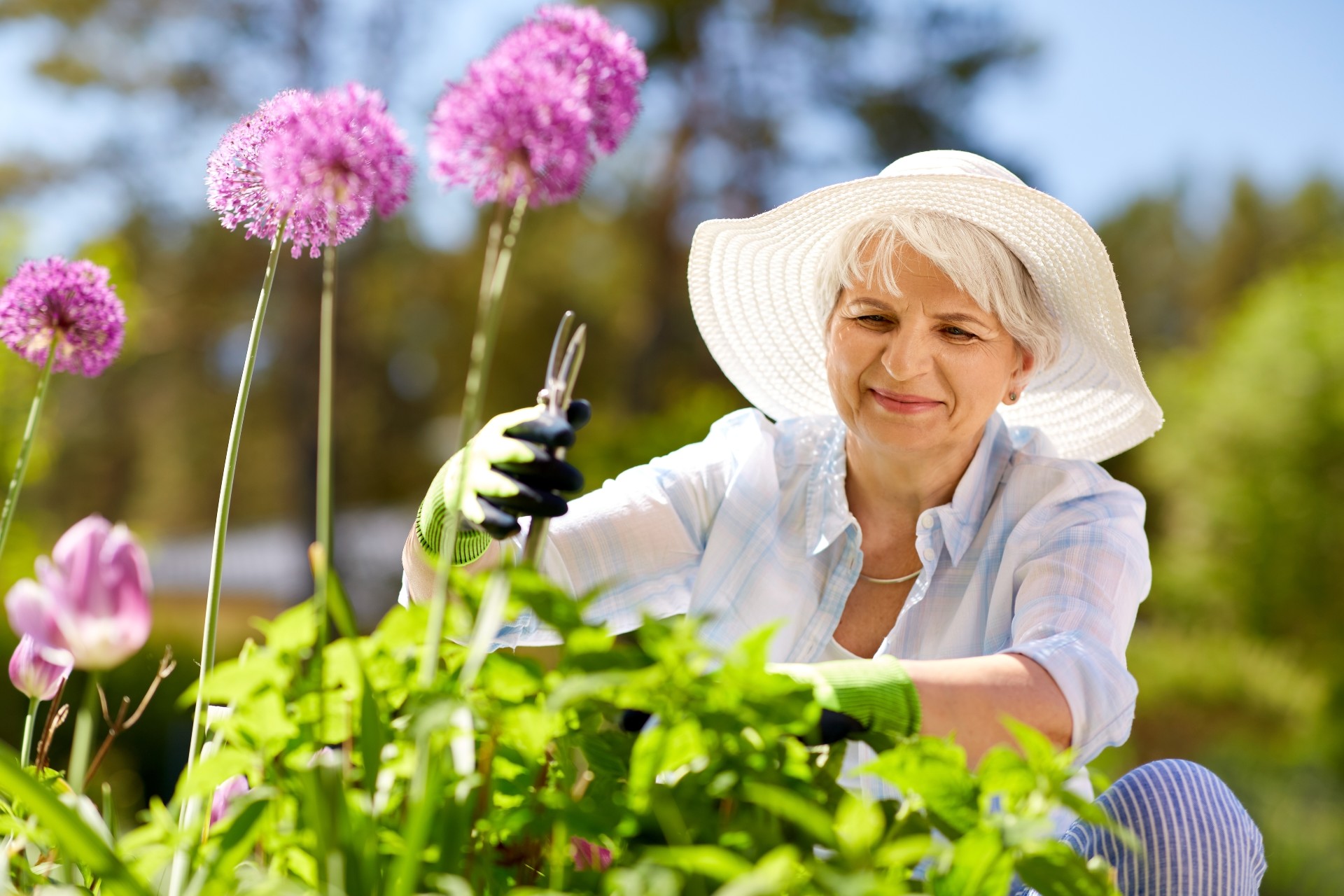Springtime is a good time to plan your garden and borders for the months ahead. Temperatures are milder in March, and the soil has warmed enough to give your plants a head start for the rainy season in May and the summer heat that follows. If you’re new to gardening in Atlanta, read on for our beginner-friendly tips on how to start a garden you can enjoy year-round.
This is about you.
What would you love to grow? Would you like to harvest your own tomatoes and lettuce for salads? Do you dream of having fresh flower arrangements filling your home? Maybe you’re an avid cook and wish for the convenience of fresh herbs to add to your meals? If you’re wondering how to start a garden, start by growing what you love, and let your garden reflect your interests and passions.
Time to shop!
Have fun browsing through a local plant nursery or garden store. With hundreds of varieties of herbs, vegetables, flowering plants and shrubs to choose from, it’s tempting to do too much. Decide how much time you can devote to gardening, and start with a little at a time. As you think about how to start a garden, decide whether you’d like to grow plants from seed or purchase starters to put straight into the soil. Many vegetables and flowers are easy to grow from seed, making this a simple and affordable choice for many types of plants.
While you’re shopping, pick up the tools you’ll need. Here are the essentials for most garden projects:
- Shovel
- Hoe
- Digging fork
- Hand trowel
- Watering can
- Hose
- Garden gloves
- Potting soil (for potted plants or containers)
7 tips for beginning gardening:
- Know your plot. Observe where sun and shade fall in your plot, and think about what you might like to see in those spots. It’s also important to test your soil to see whether it’s acidic or alkaline, and whether you need to enrich or amend it.
- Do a rough sketch. Let your imagination guide how to start a garden. Sketch out on paper the size of your plot and where you see your plants going. Design with colors and textures in mind. Make sure to account for differing heights and spread, and allow enough space for each plant to mature.
- Give them growing room. Many new gardeners plant too many seedlings too close together, which stunts growth and requires thinning later. If you’re planting a new tree, look at fully grown specimens to see how close you should be planting to your house foundation or roof overhang.
- Prepare the soil. An important detail for how to start a garden is to ensure there’s clean, fertile soil — this will reward you with healthy plants for years to come. Weed and prepare vegetable and flower beds by putting down organic fertilizer and a fresh layer of quality topsoil. Root activator or mycorrhizae powder sprinkled in the planting hole will help your new plants thrive.
- Watering. As a rule, water the root ball rather than the leaves or trunk, as the roots are what absorb water. Feed your plants with the appropriate fertilizer. This is usually every fortnight during the growing season in spring and summer. Watering deeply once or twice a week rather than a little every day encourages deeper root growth, protecting your plants from windy or hot weather.
- Weeding. Weeds are inevitable, so plan to spend at least one day a week pulling them to keep them from getting out of control. Pull them out after you’ve watered, as they’ll come out easier. Covering the soil with mulch or straw will also help reduce weeds while keeping the plant roots cool.
- Be picky about pests. Most garden pests don’t do much harm, and natural predators such as birds will keep them in check. However, certain pests can ruin your vegetable or flower patch overnight, and you need to act. Check your plants daily for aphids, slugs, Japanese beetles and other pests, and try to use nonchemical methods of control, especially on vegetables and other edible plants.
Feeling Grounded: The Health Benefits of Gardening
Working in your garden encourages you to move, bend, stretch and lift — you expend a lot of energy. It’s also a great way to relieve stress — feeling the warmth of the sun and the soil in your hands can be very grounding — pun intended. We reconnect with the earth, and focus on growth and the cycles of nature, helping to nurture our mental well-being.
Gardening also teaches us to practice acceptance of unpredictability in life. There are so many elements beyond our control, so we learn to do our best with what we can and let go of the rest. Gardening also helps us rise above perfectionism and self-criticism. Beginners and veteran gardeners alike make their share of mistakes, so we learn to shrug them off and keep on growing.
And of course, it’s enormously rewarding to watch what we’ve planted grow, thrive and bloom. Your garden can yield fresher and healthier produce than the grocery store, and you have the satisfaction of knowing you grew it yourself.
What will your garden grow?
Are you asking yourself, “What can I grow in Georgia?” Most of Georgia falls within US Hardiness Zone 7a and 8b, with the cold temperatures between 5 and 10 degrees Fahrenheit. We’ve compiled a list of popular plants for these zones, but make sure to check the hardiness zone for your specific ZIP code.
Good for beginning gardening:
Flowers:
- Begonias
- Black-eyed Susans
- Coneflowers
- Cosmos
- Dahlias
- Easter lilies
- English daisies
- Evergreen holly ferns
- Lenten roses
- Pansies
- Petunias
- Winter daphne
- Wisteria
- Zinnias
Fruits:
- Apples
- Blackberries
- Cantaloupes
- Peaches
- Pears
- Pecans
- Persimmons
- Strawberries
- Watermelons
Vegetables:
- Beets
- Broccoli
- Cabbage
- Carrots
- Cucumbers
- Eggplant
- Field peas
- Lettuce
- Lima beans
- Okra
- Peppers
- Pumpkins
- Sweet corn
- Tomatoes
- Vidalia onions
A Perfect Place to Put Down Roots
Gardening is among the favorite hobbies for seniors at Canterbury Court. Residents enjoy personal garden plots to grow their favorite flowers and produce. We also have a group of orchid enthusiasts who tend to their beautiful and exotic blooms in our purpose-built orchid greenhouse. From beginners to green thumbs, all are welcome at Canterbury Court. Come and grow with us — call 404-365-3163.


